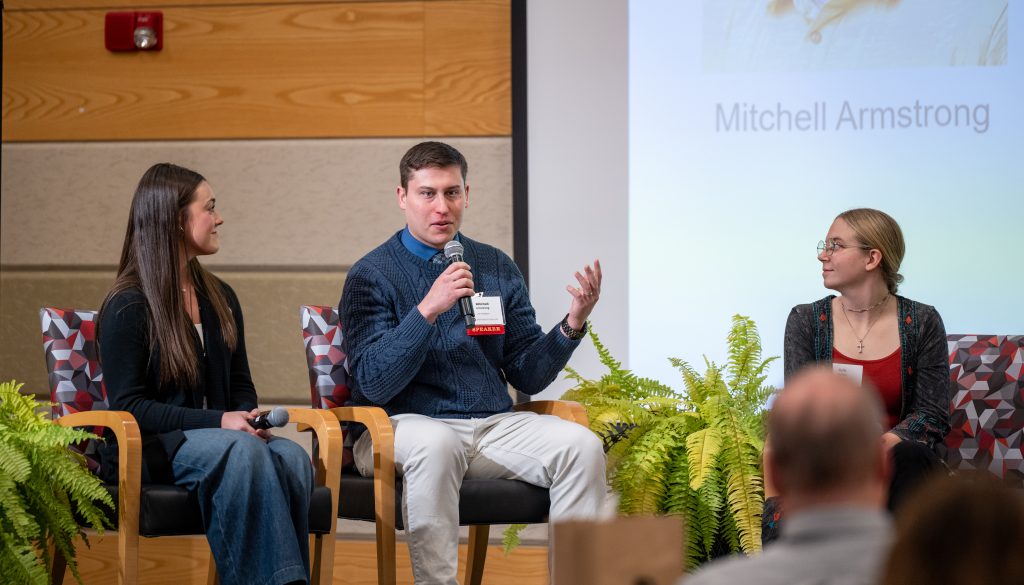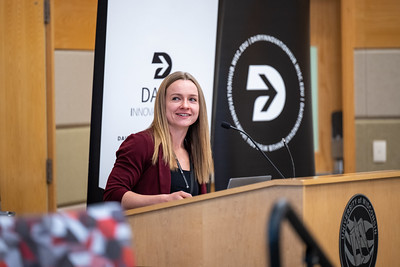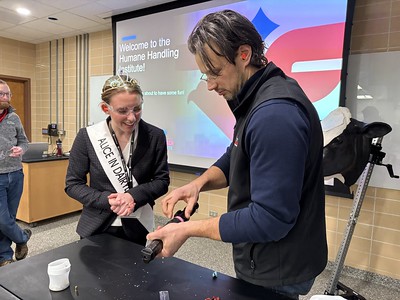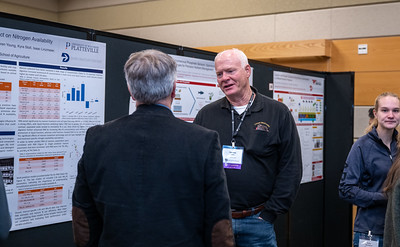
Mitchell Armstrong (center), a PhD student in food science at UW-Madison speaks during the student panel at the Dairy Innovation Hub’s Dairy Summit. Photo by Pat Deninger
The Dairy Innovation Hub held its sixth annual Dairy Summit on Tuesday, November 18, at the UW–River Falls campus. Through poster sessions, research presentations, and a panel discussion, the summit highlighted the latest Hub-funded research underway at UW–Madison, UW–Platteville, and UW–River Falls, addressing challenges facing today’s dairy community.

The event drew roughly 175 in-person attendees—including researchers, campus affiliates, students, dairy professionals, and farmers—with an additional 75 participants joining virtually. Randy Romanski, Secretary of the Wisconsin Department of Agriculture, Trade, and Consumer Protection, attended, emphasizing the Hub’s statewide impact: “DATCP is a big supporter of the Dairy Innovation Hub. It’s a great way to connect all these great resources Wisconsin has to offer… It binds [the universities] all together, and it’s a great concept.”
Funded by a $7.8 million annual investment from the state of Wisconsin, the Dairy Innovation Hub leverages research and development across the Madison, Platteville, and River Falls campuses to ensure Wisconsin’s $52.8-billion dairy community remains a global leader. Since its launch in 2019, the Hub has funded 260 projects and 23 faculty positions.
During welcome remarks, UW–River Falls Interim Chancellor John Chenoweth highlighted the depth and breadth of funded research, along with student opportunities and tangible outcomes for end-users. “The Hub is a great example of how the state can invest in the Universities of Wisconsin to educate tomorrow’s talented workforce and support Wisconsin businesses,” Chenoweth said.
UW–River Falls College of Agriculture, Food and Environmental Sciences Dean Mike Orth added that the Hub’s research projects provide “big ideas to solve big problems.”

The summit opened with a panel featuring four students from across the three universities: Mitchell Armstrong and Gracie Krahn (UW–Madison), Kylie Beilke (UW–River Falls), and Mackenzie Krajco (UW–Platteville). The discussion centered on how each student became involved with the Hub and how their unique research and outreach experiences have strengthened their professional development, building skills, confidence, and connections within the dairy community.
Armstrong, a doctoral student in food science from Appleton, reflected on his path to studying dairy foods: “I realized that dairy is a big part of our economy, and it energizes me every day to do something I love that also ties back to a Wisconsin industry and offers great prospects for my future.”
University researchers presented preliminary findings on six projects during the research introductions, covering each of the Hub’s four priority areas: enriching human health and nutrition; ensuring animal health and welfare; growing farm businesses and communities; and stewarding land and water resources.
Grace Lewis, an assistant professor in animal and food science and Hub-funded faculty member at UW–River Falls, presented her research on using dairy-derived lipids for intravenous fat emulsion applications. After her presentation, Lewis reflected on what she enjoyed most about the event, noting, “The favorite part of the day is definitely hearing the range of projects. It covers everything from sustainability to animal health to food to economics. It’s just amazing how far the dairy industry spreads and how the Dairy Innovation Hub supports that.”

Azhar Uddin, an assistant professor in agricultural economics and Hub-funded faculty at UW–River Falls, shared his feasibility study to establish a Choice and Sensory Evaluation Lab (CSEL) at UW–River Falls. If implemented, the lab could support regional dairy companies while creating student engagement and career opportunities. Uddin emphasized the Hub’s unifying role, “farmers, processors, industry leaders, researchers, and even legislators, because everything is connected, and together it produces the whole outcome of the dairy industry,” Uddin said.
Other research presentations focused on innovative dairy forage processing equipment, improving alfalfa growth with plasma technology, the role of genetics in chronic mastitis, and the potential of fresh colostrum on immune development for dairy calves.
Following lunch, attendees browsed 29 posters highlighting Hub-funded research across the four priority areas and three participating campuses.
The summit concluded with three high-impact tours showcasing UW–River Falls facilities and programs with connections to the Dairy Innovation Hub.
In the Wuetrich Family/Grassland Dairy Center of Excellence, visitors viewed equipment used to manufacture value-added products sold at the Falcon Creamery store. Even at pilot scale, this facility prepares students for careers in dairy processing. Guests also toured Lewis’s lab to see key research tools, including the high-pressure homogenizer which enables research into improving functionality of milk components like fats and proteins.
During the Meat Plant tour, attendees explored the facility’s processing and research capabilities. The walkthrough of processing and fabrication spaces emphasized operational standards and the integral role of student training. Participants also learned about ongoing research in food safety, beef-on-dairy management, and value-added product development.

The final tour showcased the Humane Handling Institute (HHI) and its role in advancing animal welfare and industry training. Instructors demonstrated proper captive-bolt placement for effective stunning and allowed participants to practice using training models. A cull cow cadaver head illustrated the location of the brain and pituitary gland, demonstrating the science behind HHI’s recommendations. Insights from a collaborative UW–Madison project highlighted HHI’s broader impact on workforce development.
Tom Crave, a dairy farmer from Waterloo, praised the variety of research showcased, “I thought this would be a great opportunity to come and get reports of what is happening with the Hub, both the research that was presented by the speakers today and the research poster displays. This research brings value to the dairy industry, all of agriculture, and the citizens of Wisconsin.”
Video recordings of the Dairy Summit sessions are available on the Hub’s YouTube channel at https://www.youtube.com/@dairyinnovationhub. More on the Dairy Innovation Hub is at https://dairyinnovationhub.wisc.edu/.
Contact: Maria Woldt, Dairy Innovation Hub program manager, at 608-265-4009, or maria.woldt@wisc.edu.
